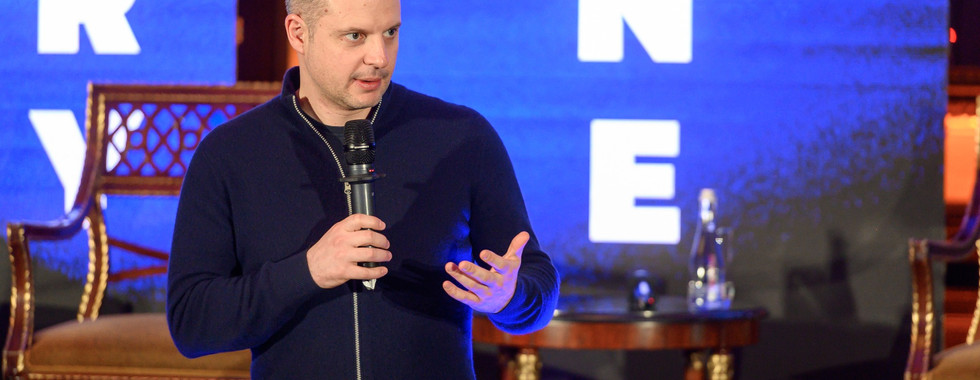Despite the full-scale war, Ukrainian and international companies continue to operate in the country, prepare development plans and make forecasts. On February 2, the European Business Association and Global Business for Ukraine held the Global Outlook: Victory Mode, where businesses, government officials, and an international investment fund discussed sentiment and expectations for 2023. Read the key insights below:
Economy, macroeconomics, investments
Andriy Pyshnyi, Governor of the National Bank of Ukraine, began his speech by thanking the Armed Forces of Ukraine and business representatives. Summarizing the results of 2022, he emphasized that the NBU’s anti-crisis measures and the resilience of Ukrainian citizens and businesses made it possible to keep the economic front. Last year, the regulator focused its actions on ensuring financial and macroeconomic stability, so businesses could stay afloat and retain jobs.
Meanwhile, inflationary processes remain manageable. At the end of 2022, year-over-year inflation was 26.6%, and in 2023, according to the NBU’s updated macroeconomic forecast, it will decline to 18.7%. Due to the effects of the war, Ukraine’s economy shrank by 30.3% in 2022. Thus, the losses in Q4 were significant due to the intensification of terrorist attacks on Ukraine’s energy system. Thus, the economy lost 4 percentage points last year due to the electricity shortage. At the same time, the foreign exchange market stopped responding to russia’s terrorist actions. No sharp fluctuations have been recorded since the second decade of October. The NBU currently sees no reason to adjust the official exchange rate or change the exchange rate regime but is instead working on a strategy to ease administrative restrictions. Its implementation will be gradual, as the state of the economy and liquidity situation allows, so as not to create additional risks to financial stability. According to the updated forecast, the key policy rate will be maintained at 25% till Q1, 2024. This is necessary to ensure the growth of deposit rates and that individuals and businesses can protect their hryvnia savings.
The NBU’s plans for this year include: 1) financing the budget deficit by the development of the domestic debt market and the attraction of aid from international partners. A total sum of USD 38 billion is needed; 2) ensuring stable operation of the banking system, particularly, through the POWER BANKING initiative, which is a unified network of Ukrainian bank branches that will operate and provide necessary services to customers even during the blackout. Today, POWER BANKING unites more than 2,000 bank branches in more than 340 settlements.
“International partners are ready to continue working with Ukraine, we are having substantive conversations, and our partners believe in our victory,” confirmed Rostyslav Shurma, Deputy Head of the Office of the President of Ukraine. “But trust in the country is important, as well as an effective fight against corruption. There are two components here: the regulatory environment and the absence of corruption. What is happening now is a systematic start to eradicating corruption and there will be no untouchables because the goal is to make the country accessible for business development. Therefore, the reform plans for the next 3-4 months include the digitalization of the procedure for changing the designated purpose of land, changes in urban planning, changes in the cost and availability of energy capacities, etc. The plans for the next few years include the reform of the state apparatus.“
At the same time, according to Mr. Shurma, the tax reform being developed by the Office of the President of Ukraine will eliminate corruption in the tax area and level the playing field for all market participants. The draft law on the reform will be finalized soon. The document will be submitted to the Parliament after it has been agreed upon with international partners, primarily the IMF. Rostyslav Shurma emphasized that the tax reform will definitely be implemented this year. Intensification of the fight against corruption will also improve the investment and business climate, which is extremely important, as private capital is key to rebuilding the country. And we plan to attract up to $10 of private capital for every dollar from international partners and the government.
As for the global outlook, Scott Thiel, Chief Fixed Income Strategist for Blackrock, believes that in 2023, inflation will decline in all key economies and prices will ease. At the same time, the company is not concerned about the high inflation, but about the possibility of it being long-termed. In the context of Ukraine, it is gratifying to note that BlackRock is playing an important role in shaping the post-war reconstruction plan. Mr. Thiel confirmed that international investors are interested in investing in Ukraine, although the war is still of their concern. And, surely, apart from geopolitical stability, it is also important for investors to see a favourable regulatory environment and government efforts in this direction.
Business sentiment, forecasts, key trends
According to Tomas Fiala, CEO, Dragon Capital, last year in Q3 the economy grew by 9%, which is more than expected, but in Q4 (due to shelling, and blackouts) the results were, unfortunately, not so good. Overall, the economy dropped by only 30% last year, which is better than everyone predicted, although, the World Bank predicted a drop of more than 40%. This means that both consumers and businesses were more resilient and began to work more efficiently and support the economy. In 2023, Dragon Capital expects a slight economic contraction, in the range of up to -5% year-over-year, assuming that the hot phase of the war will end by autumn. The recovery of economic activity will be hampered by the electricity shortage, which is likely to last for most of the year. Also, as the indicators will be compared with those from the first two months of last year, it will most likely show a negative role trend. Despite the difficult economic situation, Ukraine maintained its inflation at a decent level last year. Consumer prices rose by 26.6% year-over-year, much less than the 43% rise in 2015, although at that time the economy was much less affected by the first wave of russian aggression than it is now. Ukraine’s inflation rate was also moderate compared to its neighbours. Last year, inflation accelerated to 25% in Hungary, 20% in the Baltics, and 15% in the Czech Republic. And this is despite the fact that these countries are not fighting a full-scale war like Ukraine. Dragon Capital predicts that inflation will slow to 18% year-over-year. According to experts, the National Bank did the right thing by fixing the exchange rate in the first days of the war. And the NBU is expected to stick to this policy until the end of the hot phase of the war. If partners provide sufficient financial assistance, there will be no need to re-fix the exchange rate. Dragon Capital also expects an increase in international aid this year to USD 42 billion, which is USD 10 billion more than last year. After security risks decrease, which may occur later in the year, the National Bank will begin a gradual return to a floating exchange rate, which may lead to a moderate weakening of the exchange rate. Overall, the average annual official exchange rate is expected to reach 38 UAH/USD this year, with the exchange rate expected to remain unchanged at 36.6 for most of the year and rise to 43 UAH/USD by the end of the year.
During the dialogue, business clearly indicated its readiness to continue activities in Ukraine.
Thus, Nestle has retained all its employees, continues to work, invest and has no plans to leave the Ukrainian market. This was noted by Alessandro Zanelli, CEO, Nestle Ukraine and Moldova. Last year, the production volume fell by 15%, but the company still managed to grow in value by up to 10%. The company has donated 60 million meals as humanitarian aid and invested 25 million euros, as well as 2 million euros in solar panels for production facilities.
Tiberiu Dima, CEO, BASF Ukraine, also expressed his commitment to Ukrainians. The company is a key supplier for many industries, and they are 100% ready to support their partners in Ukraine. In 2023, they will continue to invest in knowledge exchange and import a sufficient volume of their products into the country. Sure, there are challenges – logistics disruption, human resource shortage, credit risk management, etc. However, the company is preparing for any scenario and will remain 100% in the country. Our priorities include people’s safety, support for the country, and continued supply of products.
The banking system is able to meet the effective demand for loans in 2023. This was stated by Oleksandr Pysaruk, Chairman of the Board of Raiffeisen Bank. According to Oleksandr Pysaruk, Raiffeisen Bank will continue to support critical industries this year as it did in 2022, namely supporting agriculture, logistics and retail, pharmaceuticals and fuel supply, as well as other solvent customers. “Ukrainians should get the highest appraisal, they are responsible for their obligations, including loans. We have clients with whom we have been going through the third crisis in the country, and they stay in touch with us and continue to work,” he said. “Loan rates will be about the same as they are now and will remain stable throughout the year. They are highly dependent on the NBU discount rate,” he said. “Deposit rates, especially for individuals, will grow, and the National Bank is facilitating this. “We have been preparing for a possible war for 4 months, invested a lot in IT security, and we have a great team at Raiffeisen. That helped us to work steadily all the time, to be in touch with clients, and exceed their expectations,” emphasized Oleksandr Pysaruk.
Last year, the Ukrainian IT sector also showed great resilience. Thus, the industry grew by about 6% and brought in 7.3 billion in export revenue. Taras Kytsmey, President of SoftServe, explained this by the fact that the country has a developed technological ecosystem (about 4 thousand companies), talented specialists, and professional university programs that the company helps to develop. Mr. Kytsmey also noted the favourable environment for IT, which is being shaped by the Ministry of Digital Transformation and powerful industry associations, such as the EBA IT Committee. According to his observations, it is really difficult to get new orders to Ukraine from abroad because of the military situation, but the industry is doing its best. At the same time, salaries in the industry have not changed, instead they continue to be consistently high.
The situation in the energy sector remains difficult but under control, said Sergiy Kovalenko, CEO of YASNO. The level of damage to the Ukrainian power system is 75%, and it will take months or even years to restore generation facilities. Large industries lack power from generators, so YASNO offers electricity imports and technical advice on this issue. In general, YASNO is working to develop business energy efficiency. And an important trend emerging in the country is the local generation, for example, the installation of solar panels on production sites. Mr. Kovalenko believes that joint efforts will help Ukraine return its surplus electricity generation.
We thank all the participants of the event for an interesting discussion on forecasts and plans for the future!






















Comments